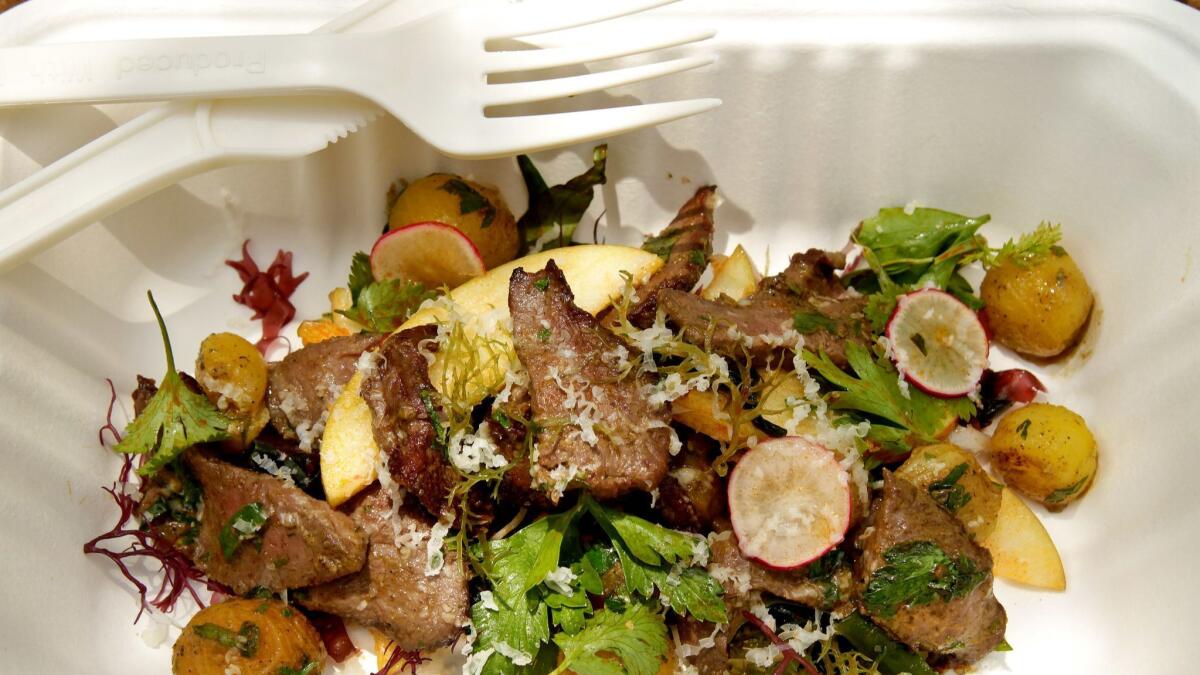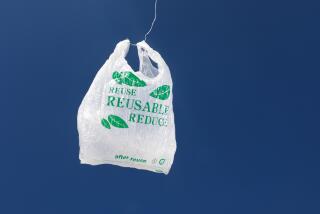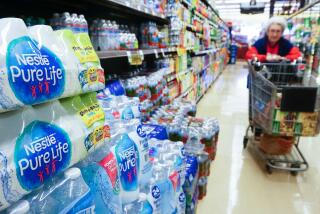San Diego poised to finalize polystyrene ban, with grace period for small restaurants

San Diego may soon join 119 other California cities in banning polystyrene food and beverage containers, which have been blamed for poisoning fish and other marine life and damaging the health of people who eat seafood.
Many restaurants, especially small eateries with one or two locations, lobbied against the ban and encouraged the city to focus its efforts instead on recycling polystyrene, which is commonly called Styrofoam.
A group of polystyrene manufacturers in November offered San Diego nearly $2 million to boost its fledgling polystyrene recycling program, but the offer was contingent on the city not moving forward with the proposed ban.
The City Council voted 5 to 3 in October in favor of the ban, but a required second vote to finalize approval of the new law was postponed and is now scheduled for a public hearing Tuesday.
There has been significant turnover on the nine-member council since the October vote, with three members being replaced in the Nov. 6 election by newcomers Dr. Jen Campbell, Monica Montgomery and Vivian Moreno.
All three are progressive Democrats who say they strongly support pro-environment legislation and initiatives.
In addition to food containers used by restaurants, the ban would apply to polystyrene egg cartons, coolers, ice chests, pool toys, dock floats and mooring buoys. Retail stores would be banned from selling such products.
The legislation would also require restaurants to make plastic utensils and straws available only upon request, a provision aimed at reducing the amount of single-use plastic products in landfills.
A state law that took effect Jan. 1 requires full-service restaurants to provide straws only upon request, so part of the city legislation would be redundant.
Nearly all national and regional restaurant chains long ago stopped using polystyrene in response to lobbying by environmental groups and backlash from customers concerned that the foam isn’t biodegradable.
But many taco shops, pizza parlors, convenience stores and other small businesses continue to use foam products to save money.
Prompted by concerns about how the ban would affect those businesses, the legislation includes waivers of up to two years for businesses with annual gross incomes of less than $500,000.
The two-year waivers would also be available to businesses that use polystyrene products for which there is no environmentally friendly replacement, and for businesses that have long-term agreements with suppliers of polystyrene products.
If approved Tuesday, the new law would take effect 30 days later. The legislation, however, stipulates that the ban on restaurants’ using polystyrene food containers wouldn’t take effect until 90 days after the law’s effective date, which would be mid-May.
The San Diego Regional Chamber of Commerce and the California Restaurant Assn. continue to oppose the ban. Both groups lobbied city officials in November to consider the offer from the polystyrene manufacturers, who call themselves the American Chemistry Council.
If San Diego doesn’t move forward with the ban, the manufacturers will pay the city $250,000 to cover the costs of shipping to Los Angeles all of the polystyrene that San Diego trash haulers have been collecting in blue bins.
San Diego began allowing polystyrene packaging to be placed in blue recycling bins in late 2014 and expanded the program to allow polystyrene food packaging in July 2017.
Because there is relatively low demand for recycled polystyrene, the recycling program cost the city $124,000 in the fiscal year that ended last June and is projected to cost the city an additional $180,000 in the ongoing fiscal year.
The manufacturers are offering an additional $1.5 million to help the city upgrade its technology to boost the processing and recycling of polystyrene.
Supporters of the ban, however, say that recycling polystyrene is not the answer.
The local chapter of the Surfrider Foundation says polystyrene doesn’t biodegrade but instead breaks down into smaller pieces that are easily mistaken for food by marine wildlife.
The 5 Gyres Institute, another environmental group, says polystyrene products pollute the world’s oceans.
“Our growing reliance on disposable plastic to fuel our ‘culture of convenience’ is not without cost,” Roger Kube, a policy advisor for the institute, said last fall. “Globally, an average of 8 million tons of plastic ends up in the ocean.”
Though many small restaurants oppose the ban, some support it, including several members of a group called Business for Good San Diego.
“The convenience of a cold soda does not outweigh the necessity of a healthy planet,” said Mikey Knab, chairman of the group. “As business owners, we need a level playing field where our priorities are the long-term health of our customers and employees.”
The California Restaurant Assn., however, says polystyrene products are superior to paper products or other replacements when it comes to effectively keeping coffee, soups and other products either warm or cold.
The association also contends San Diego has rushed approval of the ban, which was first proposed in May by Councilman Chris Ward. They say more analysis is needed of how it would affect businesses.
Councilman Chris Cate, who cast one of the three votes against the ban in October, said the council should empathize with the small businesses that would be affected by a sharp increase in costs.
Councilwoman Barbara Bry, who voted in favor of the ban, said the waivers show that the city is handling the ban equitably and fairly.
“At the end of the day, the little pieces of foam get into the fish, and that’s not good for anybody,” she said in November.
If the ban is approved, fines would start at $200 for a first offense. The fine would rise to $350 for a second offense within the same 12-month period and to $500 for a third offense during that time frame.
It’s not clear how the city would enforce the ban. The Environmental Services Department, which handles trash collection, says three full-time employees costing a total of $150,000 a year would be needed, but money for those workers hasn’t been approved by the council.
Garrick writes for the San Diego Union-Tribune.
david.garrick@sduniontribune.com
More to Read
Start your day right
Sign up for Essential California for news, features and recommendations from the L.A. Times and beyond in your inbox six days a week.
You may occasionally receive promotional content from the Los Angeles Times.







